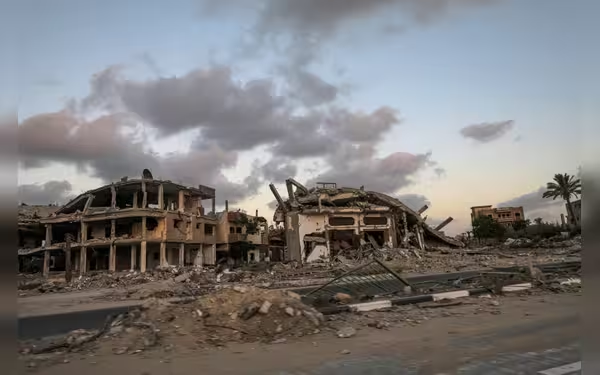Saturday, November 16, 2024 05:51 PM
Global Leaders Face Urgent Call to Address Mass Atrocities
- World leaders must act decisively on global crises.
- Ongoing conflicts demand immediate international intervention.
- Accountability for war crimes is essential for justice.
 Image Credits: thefrontierpost
Image Credits: thefrontierpostWorld leaders at UNGA face urgent crises; decisive action is needed to address mass atrocities and uphold human rights.
As world leaders gather in New York for the United Nations General Assembly (UNGA), the global community is confronted with a series of urgent crises. From the ongoing conflict between Israel and Gaza to the turmoil in Sudan, Afghanistan, Burkina Faso, Haiti, Myanmar, and Ukraine, the situation is dire. Despite the knowledge of those responsible for these atrocities, many remain unpunished and continue to inflict suffering on innocent civilians. This gathering presents a crucial opportunity for leaders to take decisive action rather than merely offering words of concern.
The crises we see today are not mere accidents or natural disasters; they are the result of decades of inaction and complicity. For instance, the unyielding military offensive in Gaza, which has led to significant Palestinian casualties, is largely supported by Western nations supplying arms to Israel. Reports indicate that Israeli forces have unlawfully targeted civilian homes, medical facilities, and humanitarian organizations, using starvation as a weapon of war. While some countries, like the United Kingdom and Canada, have begun to recognize their potential complicity and have suspended certain arms licenses to Israel, these measures are insufficient. The majority of arms continue to flow without restrictions, and this must change.
In Sudan, the situation is equally alarming. Millions have been displaced due to a brutal internal conflict, with fighters obstructing aid deliveries while famine claims lives. This crisis is not solely a result of a power struggle between two generals; it is also fueled by external powers supplying modern weapons to both sides. The United Nations has identified that arms are being funneled to the Rapid Support Forces in violation of an arms embargo, highlighting the need for immediate action to cut off supplies to all warring parties.
Moreover, the international community must address the ongoing violations in Ukraine, where Russia's air strikes continue to wreak havoc. The Taliban's systematic oppression of women and girls in Afghanistan, the military junta's war crimes against the Rohingya in Myanmar, and the violence perpetrated by criminal groups in Haiti all demand urgent attention. World leaders must establish a robust civilian protection mission to assist those affected in Sudan, similar to efforts made in the Central African Republic.
Additionally, it is imperative for the international community to enforce arrest warrants issued by the International Criminal Court against those accused of orchestrating these atrocities, including high-profile figures like Vladimir Putin. Upholding the orders from the International Court of Justice to protect civilians in conflict zones such as Syria, Ukraine, Myanmar, and Gaza is essential for accountability and justice.
While the UN Security Council often struggles to act decisively due to the veto power of its permanent members, history shows that alternative paths exist. The UNGA has previously taken the lead in establishing peacekeeping missions, as seen in the 1956 Emergency Force in the Middle East. Recent cases, such as South Africa's legal action against Israel under the Genocide Convention, demonstrate that international solidarity can pressure governments to reconsider their military support.
As the UNGA convenes, it is crucial for member states to recognize their collective responsibility to protect civilians and uphold human rights. The recent establishment of a procedure requiring permanent members of the Security Council to justify their vetoes is a step in the right direction. In the coming days, Palestine will seek to leverage international pressure to enforce the International Court of Justice's advisory opinion on Israel's occupation through a non-binding resolution.
The world is watching as leaders gather in New York. This is a pivotal moment for the international community to demonstrate its commitment to human rights and the protection of civilians. The actions taken—or not taken—during this assembly will resonate far beyond the walls of the United Nations, shaping the future of countless lives caught in the crossfire of conflict. It is time for world leaders to transform their words into meaningful actions that can bring about real change.













